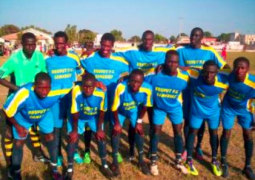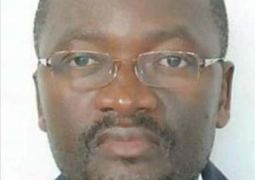As
the world is hit by the deadly Corona Virus disease of which The Gambia is not
an exception, Dr. Mariam Jaw Mbowe, currently pursuing postgraduate program in
medical physiology at the Ankara YildirimBeyazit University in Turkey took her
precious time and explained in simple terms about COVID-19. She also
emphatically made it clear that “we have to work together and break the chain
in order to fight the deathly Corona Virus.’
Below
is the full text of her statement
There
are many types of coronaviruses found in animals and humans. 7 have been
identified to cause infections in humans. Some give the common cold others
pneumonia and even severe respiratory distress syndrome. Two Corona viruses
were responsible for outbreaks in the past SARS (2003 in China) and MERS (2012
in Saudi Arabia). The novel coronavirus responsible for the 2019-2020 pandemic
causes an illness called COVID-19 and the virus is called SARS-CoV-2. The
membrane of the virus (outer covering is made up of lipids(fats) which can be
destroyed by soap and alcohol. When the membrane of the virus is destroyed it
leads to eventually the death of the virus.
Viruses
infect the body by latching onto and entering healthy cells. The cell is the
basic unit of life. Once inside the cell the virus makes copies of itself and
multiplies throughout the cells in the body by making new proteins leading to
formation of new viruses. The coronavirus can gain entry into the body through
the eyes, nose, or mouth. It then grabs onto the cells by latching its spikey
surface proteins to receptors on normal cells, especially those in the
airways.Specifically, the viral proteins of SARS-CoV-2 enter into cells through
the ACE2 receptors. Once inside, the coronavirus hijacks the healthy cells and
takes over command. Eventually, they kill some of the healthy cells and new
viruses will infect other healthy cells.
COVID-19,
the illness caused by the coronavirus, starts in the respiratory tract. That’s
the airway between the mouth, nose, throat, and lungs. It’s the same place that
the common cold attacks. But COVID-19 can become more serious than the common
cold because it is more likely to get deeper into the respiratory tract,
including into the lungs. That’s because the lower airways have more ACE2
receptors. Smoking cigarettes increases these receptors which might explain the
increase in deaths in smokers reported by early researches on the disease. The
way it spreads is through respiratory droplets from person to person when a
person with the virus exhales or cough which can infect surfaces and also
travel about 1 meter. This is the reason behind the advice for people to stay
one meter apart and also to avoid handshakes and touching the face with unclean
hands. There are reports from researchers that it can be transmitted through
aerosols (tinier than droplets) but more scientific information is needed to
prove it.
When
the virus enters the body and it is spotted the immune system counterattack as
a way of defense. One sign of that is a fever as the white blood cells produce
a substance which causes it. There might also be a cough mostly reported to be
dry as no sputum is produced.That is the body’s usual response to foreign
bodies (something that’s in the airways that shouldn’t be). The mounted immune response what causes the
damage to the organ systems.Symptoms reported by WHO and early findings from
Chinainclude difficulty breathing, fatigue, sorethroatand even diarrhea which
is not a very common presenting complaint.
More
than 8 in 10 cases are mild. But for some, the infection gets more severe. The
infection is reported to be worst in patients with underlying medical problems
like diabetes, heart disease like high blood pressure and heart attack,
patients with previous lung problems like asthma, COPD (chronic pulmonary lung
disease or smoker’s lung disease) cancers patients,immunosuppressed patients
just to name some examples.
As
the infection reaches the lower respiratory system, including the lungs, it can
be hard to breathe. This is when more serious medical problems can crop up.
Problems like pneumonia. This makes the airways swell and the lungs fill with
fluid. In the most severe cases, this fluid in the lungs can lead to acute
respiratory distress syndrome, or ARDS. People who get this condition are
usually already in the hospital for the illness. ARDS makes it difficult or
impossible to breathe because the lungs are grossly inflamed making gas (oxygen
and carbon dioxide) exchange difficult leading to suffocation of tissues.
As
fluid collects in the lungs, they carry less oxygen to the blood. That means
the blood may not supply organs with enough oxygen to survive. This can cause
organs like the kidneys, lungs, and liver to fail down and stop working leading
to multi organ failure and eventually death.
Not
everyone who has COVID-19 has these serious complications. And not everyone
needs medical attention. However, patients not showing symptoms can continue
infecting people who are healthy as carriers and transmitters of the infection.
Death from COVID-19 in the young is not much reported as compared to the
elderly and sick there are cases death in the young.
As
there is no drugs or vaccine found to be effective against the virus. Research is ongoing in many countries to find
the definitive treatment. Treatment is mainly supportive for example giving
paracetamol for fever and giving oxygen. Precautions can be taken as the saying
goes PREVENTION IS BETTER THAN CURE.
Let
us continue washing hands with soap and water or use alcohol-based hand
sanitizers. Cologne which has alcohol can also be used.
Whilst
coughing or sneezing cover mouth with single use tissue or use bend of elbow.
Clean frequently touch objects especially mobile phones.
Eating
healthy (balanced diet and stay hydrated by drinking water and natural juices.
Eat foods rich in vitamin C like oranges, grapefruit, pineapples, moringa to
boost the immunity
Stay
at home but also stay fit by becoming more active by doing indoor activities or
by frequently moving in the house.
Do
not share fake news only share information that is coming from official
sources.
Do
not cause panic as it will weaken the immune system further leading to worst
outcomes and stress.
Keep
educating your families and neighbors and the public about the COVID-19 and how
to stay safe from infectious diseases.
If
you think you are sick with the Virus call for help by using the
emergency call numbers to seek for help from health officials. Do not walk into
the facility to seek for care by doing you can infect thousands. Do not become a super spreader. Let us break
the chain.
#Togetherwewillwin
#Spreadtherightmessage
#LetstopCOVID-19
#Stayhome#Evdekal
For
Further Reading consult
WHO(https://www.who.int/emergencies/diseases/novel-coronavirus-2019 CDC
(https://www.cdc.gov/coronavirus/2019-ncov/index.html) websites
By Dr Mariam Jaw Mbowe
MBChB (UTG), Postgraduate Student Medical
Physiology AYBÜ Ankara Turkey.
About
the Author.Dr. Mariam Jaw Mbowe, is a medical graduate from UTG School of
Medicine and Allied Health Sciences. She graduated with a bachelors degree in
medicine and surgery. Dr Mariam is currently pursuing postgraduate program in
medical physiology at the Ankara YildirimBeyazit University in Turkey.
She
is an employee of the Edward Francis Small Teaching Hospital and was once the
medical officer overseeing the Emergency unit.
Dr
Jaw Mbowe is also a health volunteer with Chosan Charitable Medical Foundation
which is involved with medical charity work mostly in the hard to reach places
in The Gambia. She believes in sharing knowledge and as results is involved in
mentorship activities for medical students to help guide them through the
profession.
She
has special interest in Endocrinology, neurophysiology, maternal and child
health and health promotion. Recently
she was part of the World Youth Forum in Egypt where she represented Gambia
amongst thousands of youth from all over the world.
Read Other Articles In Article (Archive)
Press Release: Temporary Re-opening of Timber Re-Export Trade
May 9, 2017, 12:33 PM



